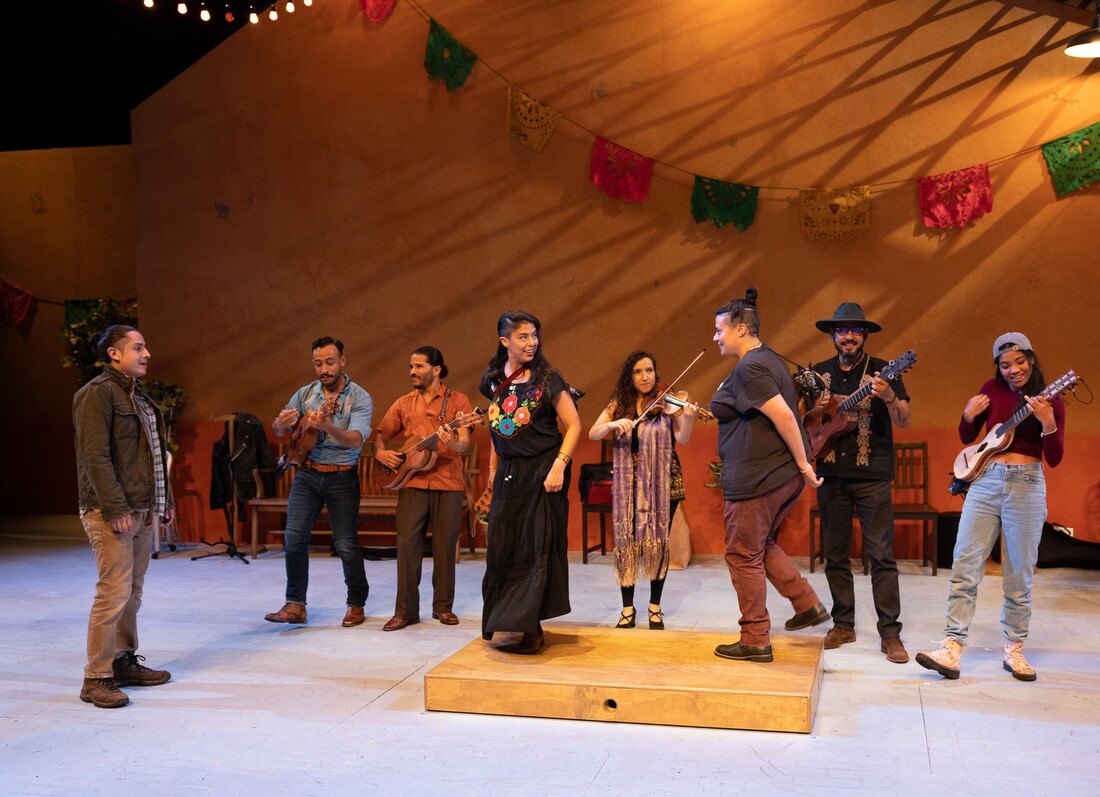|
The ensemble of "Fandango for Butterflies (and Coyotes)." Photo courtesy of La Jolla Playhouse One precisely choreographed sequence in “Fandango for Butterflies (and Coyotes)” articulates the full reality of the immigrant experience: the desperation for a better life, the danger, the struggle to survive. In a matter of a few minutes’ time, with cast members in perpetual motion, a world spins out of control.
But there is sanctuary: a community center on the grounds of a church in Chula Vista where men and women who have escaped the hardships (and worse) of their native countries and fled to America gather to sing, dance and tell stories. This is the setting for a bilingual play with music by Andrea Thome and Sinuhe Padilla. “Fandango” is a production of New York-based En Garde Arts that’s being presented by La Jolla Playhouse under the direction of Jose Zayas. Writer Thome based her characters on interviews she did in the New York City area (the play’s original setting). They are portrayed onstage in La Jolla by a fiercely committed ensemble doing double duty as actors and musicians with instruments. Padilla’s accompanying music, sung in Spanish, is alternately invigorating and affecting. Because this is a bilingual piece, screens with translated words (either from Spanish into English or the other way around depending on the moment) are positioned to the left and right above the stage. I found them more distracting than helpful, and I’m not entirely certain they’re needed. The passions and essence of the numbers sung in Spanish speak for themselves. To fully appreciate “Fandango” it would be best to actually be bilingual, and I sorely longed to be during the 90-minute show. In fact, as a Southern California native, I should be. I am blessed to live among two rich, intersecting cultures and there is no excuse for my not being more conversant with the language of those who share my region. Enough of me. The interweaving personal stories of “Fandango” are compelling ones: Rogelio (Carlo Alban) and Elvin (Danny Ray Caraballo) are stable workers, each bearing the burden of painful truths: Rogelio, from Honduras, has not seen his daughter in almost a decade; Elvin wears a monitor shackled to his angle, a reminder that deportation could come at any moment. Mari (Jen Anaya), the play’s anchor character, has a mother in failing health; Rafaela (Silvia Dionicio) is a teenager long abandoned by her mother. And yet there is hope and affection in all of them, expressed either in words or in song. The anxious plot points of “Fandango” run much more intricate than this, however, suggesting that the play overreaches and never attains tonal consistency. It can be starkly poetic, as when Elvin’s cousin Johan (Roberto Tolentino) recites in monologue; playful, as when the likable Pili (Frances Ines Rodriguez) breaks down shy Rafaela’s barriers; wistful, as when Rogelio sincerely courts Mari in vain; and as exultant as the song and dance that at times fills the Mandell Weiss Forum with percussive energy. Maybe that’s why “Fandango for Butterflies (and Coyotes)” feels one draft away from completion though it debuted back in 2020 in New York City’s boroughs. Even as is, it’s a story that can never be told enough – at least until grave wrongs are righted and those who long to share the freedoms that we cherish are welcomed and respected. “Fandango for Butterflies (and Coyotes” runs through Sept. 25 at La Jolla Playhouse.
0 Comments
Leave a Reply. |
AuthorDavid L. Coddon is a Southern California theater critic. Archives
July 2024
Categories |
David Coddon |
|
